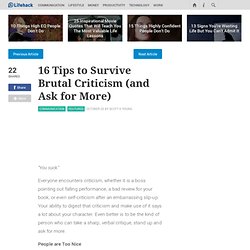

Reading Body Language. Dealing with Difficult People. Some people go to extraordinary lengths to be difficult.

Think of the diva actress whose on-set needs can never be met or the boss who keeps moving the goal posts. The difficult person elevates the deliberate provocation to an art form. The underlying message is often, "Unless you agree with me and go along, you'll regret it. " One clue that a person is attempting to intimidate or manipulate you is the use of unpredictable, or protean, behavior—acts that are random and seemingly out of the blue. A dictator keeps his minions guessing—and scared. Erratic behavior is a powerful weapon because it defies accurate prediction. Flying into a rage or staring you down and dismissing you summarily are common strategies to keep you off-kilter. Erratic behavior served adaptive ends in our past, and it still does. Protean behavior evolved to prevent people from being psyched out. If such behavior comes from a boss or a spouse, you've got some tricky choices to make. 38 Ways To Win An Argument. 9 Useful Strategies to Dealing with Difficult People at Work.
Ever encountered someone who frustrates you so much that you feel like you want to pull your hair, jump around the room and just scream out loud? You’re not alone.Over the years, I’ve encountered my fair share of difficult people. People who don’t turn their work in as promised, people who don’t show up for meetings, people who stick vehemently to their views and refuse to collaborate, people who push back on work that they’re responsible for – and more. Even as I run my own business, I work on collaboration projects and there are times where there are difficulties in getting a consensus because everyone is so firm in their views.
Asperger's and Relationships.
How Can I Avoid Becoming an Introverted Weirdo? 7 Strategies for Introverts (by Introverts) to Ignite Socializing Skills. Life, to me, is all about human connections.

No, it’s not so much about the “professional networking” aspect or building a social media network full of fans and promoters. Even in our increasingly tech-laden world, it’s those pure, totally uninhibited, simply “human” face-to-face connections that mean the absolute most in life. There’s something so unique and special about the bonds we forge over laughter and smiles, as well as those shared over tears and during moments of adversity when communities unite to overcome sorrow. However, if you’re more of an “introvert” like me and not a Type-A, extroverted personality, those human connections feel a bit tougher to come by. I’d rather listen that talk, ask questions than rattle off answers. Are you the same way? “I have to force myself to get out there. Honestly, what would we do without the wisdom of Nike’s infamous catch-phrase? Get creative and push yourself to extend your boundaries.
“Warmth. The Awkward Human Survival Guide: How to Handle Life's Most Uncomfortable People. How to Fight Right. 5 Ways to Change Someone's Mind. An expert recently claimed that knowing--and using-- a few simple rules can help you change the minds of other people.

The first rule of changing minds is to keep your message short, sharp, and simple. People tend to respond less well to long convoluted arguments, according to Kevin Dutton, Ph.D., author of Dutton's book isn't itself a short or oversimplified how-to book. Dutton, a psychologist and research fellow at the Faraday Institute for Science and Religion at Cambridge Univesity, fills out each of his points with numerous clarifying (and often amusing) examples and anecdotes from every nook and corner of social psychology. The crux of Dutton's message is contained in his five elements, made easy to remember with the acronym . 16 Tips to Survive Brutal Criticism (and Ask for More) “You suck.”

Everyone encounters criticism, whether it is a boss pointing out falling performance, a bad review for your book, or even self-criticism after an embarrassing slip-up. Your ability to digest that criticism and make use of it says a lot about your character. Even better is to be the kind of person who can take a sharp, verbal critique, stand up and ask for more. People are Too Nice Most people won’t tell you what they think of you. I believe it is because most of us have shied away from getting honesty our whole lives. The art of mindreading: Empathy or rational inference? The ability to infer what another person is thinking is an essential tool for social interaction and is known by neuroscientists as "Theory of Mind" (ToM), but how does the brain actually allow us to do this?

We are able to rationally infer what someone knows, thinks, or intends, but we are also able to "slip into their shoes" and infer how they feel, and it seems that the brain processes these different types of information in different ways, as confirmed by a new report in the June 2010 issue of Elsevier's Cortex. Prof. Elke Kalbe and colleagues from the Institute of Neuroscience and Medicine at the Research Centre Juelich and the Neurological University Clinic Cologne, Germany, studied a group of male volunteers as they performed a computerized task, which assessed their abilities in both emotional and rational inference.
Coauthor Prof.